Authors & editors
ANU Press has collaborated with a diverse range of authors and editors across a wide variety of academic disciplines. Browse the ANU Press collection by author or editor.

Rebalancing and Sustaining Growth in China (Chinese version) »
中国经济再平衡与可持续增长
Authored by: Huw Mckay, 宋立刚 主编
Publication date: November 2013
中国经济需要重新平衡的想法,不再是国家内部或外部的争议。无论是收入不平等日益认识到在家里仍然很大外部盈余;对消费和产业升级的政策话语的焦点;住房负担能力的大幅度下滑的经济,政治和社会紧张局势之间的深刻冲突工业化,城镇化和生物圈顶部的国有企业和民营企业的盈利能力之间的鸿沟;或单向压力推动实际汇率的证据,赞成的高度不平衡的结构是无所不在的。
Chinese print version of this book is available from Social Science and Academic Press

The Struggle of the Shi‘is in Indonesia »
Authored by: Zulkifli
Publication date: November 2013
The Struggle of the Shi‘is in Indonesia is a pioneering work. It is the first comprehensive scholarly examination in English of the development of Shiism in Indonesia. It focuses primarily on the important period between 1979 and 2004 – a period of nearly a quarter of a century that saw the notable dissemination of Shi’i ideas and a considerable expansion of the number of Shi’i adherents in Indonesia. Since Islam in Indonesia is overwhelmingly Sunni, this development of Shiism in a predominantly Sunni context is a remarkable phenomenon that calls for careful, critical investigation. There is also an important examination of the principal ideas underlying the Madhab Ahl al-Bayt, the Imamate and Imam Madhi, Ja‘fari jurisprudence and ritual piety. Appropriately, in his discussion, Zulkifli provides a succinct outline of contrasts with Sunni ideas and practice. He also examines the publishing efforts that underpinned the dissemination of Shi’i ideas and the founding of IJABI (Ikatan Jamaah Ahlul Bait Indonesia) in July 2000 for the propagation of Ahl al-Bayt teachings. Given the Indonesian context, Zulkifli is also concerned with Sunni reactions to these Shi’i developments – a story that continues to unfold to the present. This book as a work of great value and significance for the continuing understanding of the richness and complexity of Indonesian Islam.

Professionalism in the Information and Communication Technology Industry »
Edited by: John Weckert, Richard Lucas
Publication date: October 2013
Professionalism is arguably more important in some occupations than in others. It is vital in some because of the life and death decisions that must be made, for example in medicine. In others the rapidly changing nature of the occupation makes efficient regulation difficult and so the professional behaviour of the practitioners is central to the good functioning of that occupation. The core idea behind this book is that Information and Communication Technology (ICT) is changing so quickly that professional behaviour of its practitioners is vital because regulation will always lag behind.

Watriama and Co »
Further Pacific Islands Portraits
Authored by: Hugh Laracy
Publication date: October 2013
Watriama and Co (the title echoes Kipling’s Stalky and Co!) is a collection of biographical essays about people associated with the Pacific Islands. It covers a period of almost a century and a half. However, the individual stories of first-hand experience converge to some extent in various ways so as to present a broadly coherent picture of ‘Pacific History’. In this, politics, economics and religion overlap. So, too, do indigenous cultures and concerns; together with the activities and interests of the Europeans who ventured into the Pacific and who had a profound, widespread and enduring impact there from the nineteenth century, and who also prompted reactions from the Island peoples. Not least significant in this process is the fact that the Europeans generated a ‘paper trail’ through which their stories and those of the Islanders (who also contributed to their written record) can be known. Thus, not only are the subjects of the essays to be encountered personally, and within a contextual kinship, but the way in which the past has shaped the future is clearly discernible. Watriama himself features in various historical narratives. So, too, certain of his confrères in this collection, which is the product of several decades of exploring the Pacific past in archives, by sea, and on foot through most of Oceania.

The Muse as I Hear Her »
Authored by: Giles Pickford
Publication date: October 2013
This volume, The Muse as I Hear Her, has been compiled at the urging of ANU Emeritus Faculty to honour Giles Pickford, an admired colleague of long standing. Giles began his appointment in the ANU Public Affairs Division on the 21st of November 1988 and retired on the 8th of May 1998. At that time, a group of colleagues had formed an association that was to become the ANU Emeritus Faculty. From 1998 to the end of 2012, Giles was Secretary to the Emeritus Faculty. He served the Emeritus Faculty for a longer period than he was officially employed at ANU, and continued in the role of Corresponding Secretary until health intervened at the age of 73.
The Emeritus Faculty wanted to honour Giles for his good fellowship and for the many services he rendered to the Faculty by highlighting one of Giles' special interests: his close involvement in the ANU Poets' Lunch.
This volume is a token of recognition from friends and colleagues to Giles Pickford for his multiple contributions to the life of the University and its community.

Tajikistan »
A Political and Social History
Authored by: Kirill Nourzhanov, Christian Bleuer
Publication date: October 2013
This book is a historical study of the Tajiks in Central Asia from the ancient times to the post-Soviet period. For millennia, these descendants of the original Aryan settlers were part of many different empires set up by Greek, Arab, Turkic and Russian invaders, as well as their own, most notably during the Middle Ages. The emergence of the modern state of Tajikistan began after 1917 under Soviet rule, and culminated in the promulgation of independence from the moribund USSR in 1991. In the subsequent civil war that raged between 1992 and 1997, Tajikistan came close to becoming a failed state. The legacy of that internal conflict remains critical to understanding politics in Tajikistan a generation later.
Exploring the patterns of ethnic identity and the exigencies of state formation, the book argues that despite a strong sense of belonging underpinned by shared history, mythology and cultural traits, the Tajiks have not succeeded in forming a consolidated nation. The politics of the Russian colonial administration, the national-territorial delimitation under Stalin, and the Soviet strategy of socio-economic modernisation contributed to the preservation and reification of sub-ethnic cleavages and regional identities. The book demonstrates the impact of region-based elite clans on Tajikistan’s political trajectory in the twilight years of the Soviet era, and identifies objective and subjective factors that led to the civil war. It concludes with a survey of the process of national reconciliation after 1997, and the formal and informal political actors, including Islamist groups, who compete for influence in Tajik society.
“Tajikistan: A Political and Social History is the best source of information on this important country in the English language. Drs Nourzhanov and Bleuer present a comprehensive yet detailed account of the past and prospects of this emerging nation, and have filled one of the major gaps in Central Asian scholarship. This book must be read by those who wish to grasp the vagaries of Central Asia’s evolving political and cultural landscapes.”
— Reuel Hanks, Professor of Geography, Oklahoma State University, and Editor of the Journal of Central Asian Studies.
“If Tajikistan is known outside its region, it is often for the civil war that gravely damaged it. This volume authoritatively provides the longer perspective to the unsettling events of the 1990s and skilfully explains them in terms of history, social structure, and sub-state identities. In addition to highlighting a wealth of local factors, it is insightful on the ways in which antagonists can be transformed into broader ethnic and regional blocs. Kirill Nourzhanov and Christian Bleuer are erudite guides to an understudied part of Central Asia, while astutely instructing us about larger patterns of state-society relations and their impact on the logic of conflict.”
— James Piscatori, Professor of International Relations, Durham University.

The ADB's Story »
Edited by: Melanie Nolan, Christine Fernon
Publication date: October 2013
‘The Australian Dictionary of Biography captures the life and times and culture of this country in an absolutely distinctive and irreplaceable way. It is the indispensable record of who we are, and of the characters who have made us what we are. I could not be prouder of ANU’s continuing role as custodian of this crucial part of our national legacy.’
— Professor the Hon. Gareth Evans AC QC, Chancellor, The Australian National University
‘A mature nation needs a literary pantheon of inspiring and instructive life histories, a gallery of all the possibilities of being Australian. The Australian Dictionary of Biography responds to that vital need in our culture. It is a stunning collaborative achievement and I feel so proud that we have such an activity here in Australia—to a great extent it describes and defines Australia.’
— Professor Fiona Stanley AC, Australian of the Year, 2003
‘The Australian Dictionary of Biography is our greatest collective research project in the humanities and a national triumph. We have much to learn from it. The project is continuing to change as we mature nationally, with deeper understanding about the impacts of gender, race, environment, religion, education, language, culture, politics, region and war on what we are and what we may become.’
— The Hon. Dr Barry Jones AO
‘Australia is very fortunate to have a national biographical dictionary that is democratic as well as distinguished, one that represents the rich variety of Australian culture. The Australian Dictionary of Biography gathers together the stories of people from all walks of life, from the outback to the city and from the bush to the parliament. It is a monument of scholarship—and it is for everyone.’
— Dr Dawn Casey PSM
‘Few things are more illuminating than taking a random stroll through a volume of the Australian Dictionary of Biography—new insights into our greatest men and women, chance encounters with people whose exploits are all too often unpardonably overlooked. I first read the ADB with my mother, Coral Lansbury, who wrote four entries. One of her mentors, Bede Nairn, was a prodigious contributor. The Australian story is a story of Australians, no better told than in the ADB.’
— The Hon. Malcolm Turnbull MP
‘I find it difficult to bring to mind more than a handful of comparable enterprises in the fields of biography, history, philology or the social sciences more broadly—anywhere in the world. The status and appeal of the Australian Dictionary of Biography do not lie only in its scale and size. They reside also in the meticulous research, the erudition and scholarship, and the sweat and possibly tears involved in the editorial and publishing process. Its constituent dramatis personae are an eclectic mix of the noble and the notorious, the famous and the largely unsung. The underlying theme of the mosaic is quite clear: nothing less than the making and remaking of Australia.’
— Her Excellency Ms Penelope Wensley AC, Governor of Queensland
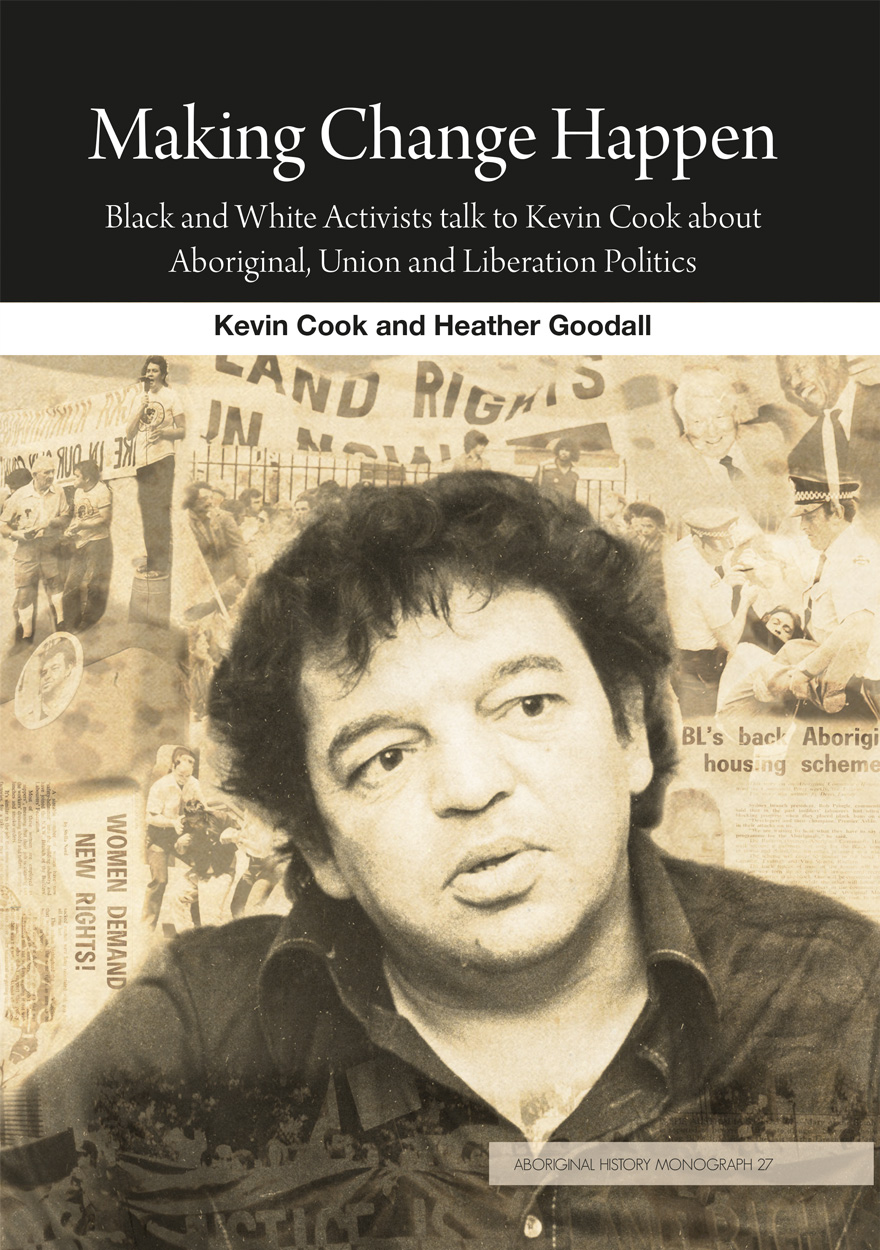
Making Change Happen »
Black and White Activists talk to Kevin Cook about Aboriginal, Union and Liberation Politics
Authored by: Kevin Cook, Heather Goodall
Publication date: September 2013
This book is a unique window into a dynamic time in the politics and history of Australia. The two decades from 1970 to the Bicentennial in 1988 saw the emergence of a new landscape in Australian Indigenous politics. There were struggles, triumphs and defeats around land rights, community control of organisations, national coalitions and the international movement for Indigenous rights. The changes of these years generated new roles for Aboriginal people. Leaders had to grapple with demands to be administrators and managers as well as spokespeople and lobbyists. The challenges were personal as well as organisational, with a central one being how to retain personal integrity in the highly politicised atmosphere of the ‘Aboriginal Industry’. Kevin Cook was in the middle of many of these changes – as a unionist, educator, land rights campaigner, cultural activist and advocate for liberation movements in Southern Africa, the Pacific and around the world. But ‘Cookie’ has not wanted to tell the story of his own life in these pages. Instead, with Heather Goodall, a long time friend, he has gathered together many of the activists with whom he worked to tell their stories of this important time. Readers are invited into the frank and vivid conversations Cookie had with forty-five black and white activists about what they wanted to achieve, the plans they made, and the risks they took to make change happen.
“You never doubted Kevin Cook. His very presence made you confident because the guiding hand is always there. Equal attention is given to all. I am one of many who worked with Cookie and Judy through the Tranby days and in particular the 1988 Bicentennial March for Freedom, Justice and Hope. What days they were. I’m glad this story is being told.”
— Linda Burney, MLA New South Wales
“Kevin Cook was a giant in the post-war struggle for Aboriginal rights. His ability to connect the dots and make things happen was important in both the political and cultural resurgence of the 1970s onwards.”
— Meredith Burgmann, former MLC, New South Wales
“Kevin has had a transformative effect on the direction of my life and the lives of so many other people. This book is an important contribution to understanding not only Kevin’s life but also the broader struggles for social and economic justice, for community empowerment and of the cooperative progressive movement. It will greatly assist the ongoing campaign for full and sustainable reconciliation.”
— Paddy Crumlin, National Secretary, Maritime Union of Australia
“Cookie has made great contributions in enhancing the struggles of our people. He is a motivator, an astute strategist, and an excellent communicator with wonderful people skills. It’s a pleasure to be able to call him a mate and a brother.”
— John Ah Kit, former MLA, Northern Territory
For more information on Aboriginal History Inc. please visit aboriginalhistory.org.au.
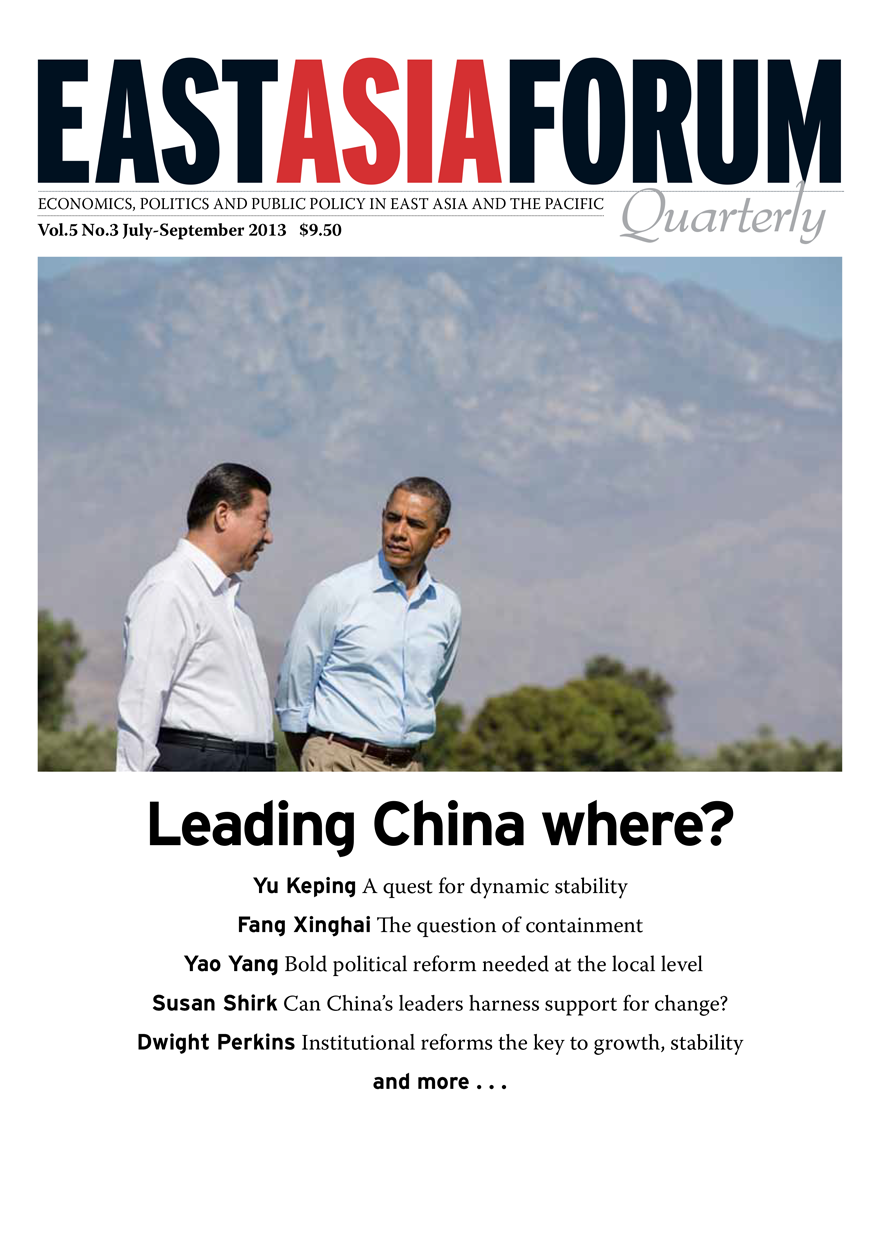
East Asia Forum Quarterly: Volume 5, Number 3, 2013 »
Publication date: September 2013
East Asia Forum Quarterly grew out of East Asia Forum (EAF) online, which has developed a reputation for providing a platform for the best in Asian analysis, research and policy comment on the Asia Pacific region in world affairs. EAFQ aims to provide a further window onto research in the leading research institutes in Asia and to provide expert comment on current developments within the region. The East Asia Forum Quarterly, like East Asia Forum online, is an initiative of the East Asia Forum (EAF) and its host organisation, the East Asian Bureau of Economic Research (EABER) in the Crawford School of Economics and Government in the College of Asia & the Pacific at The Australian National University.
Download for free
Not available for purchase
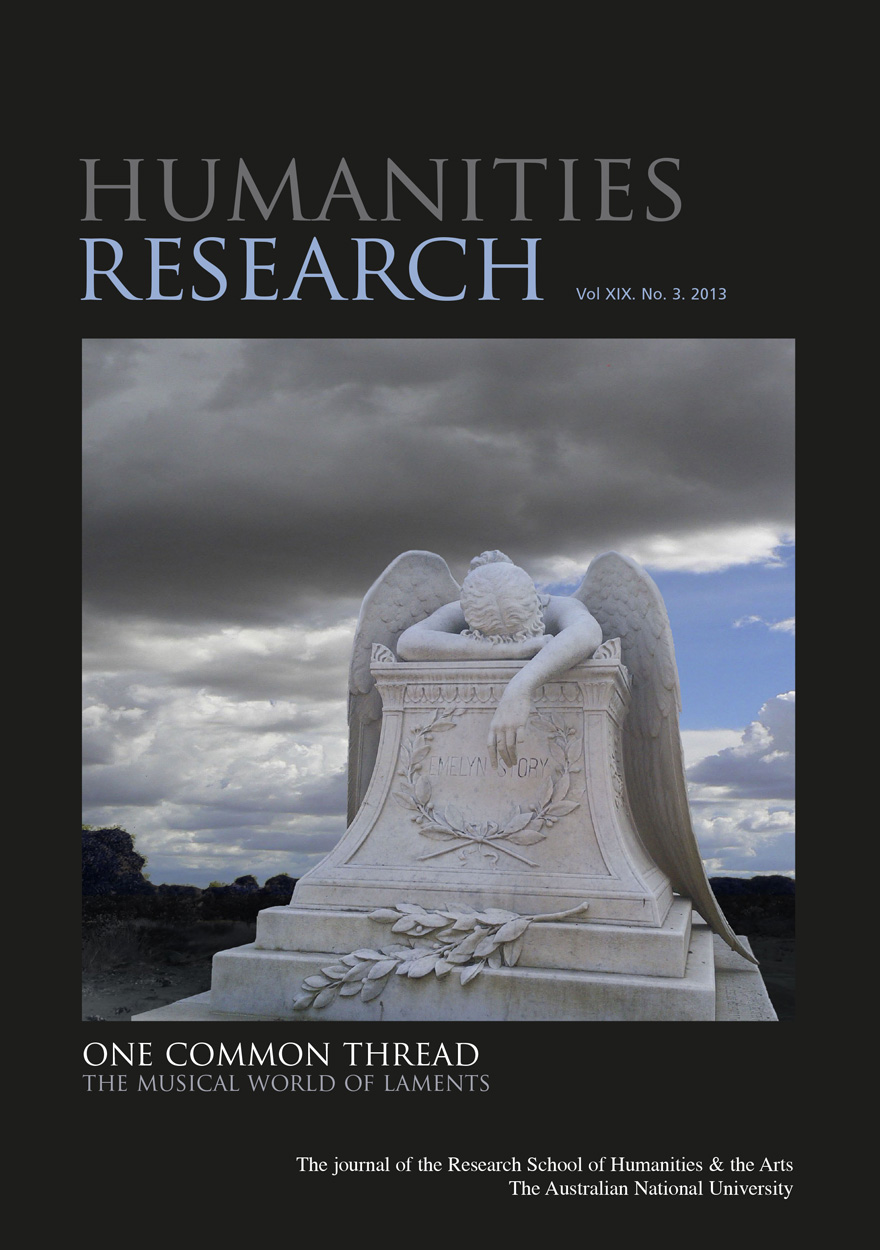
Humanities Research: Volume XIX No. 3. 2013 »
One Common Thread: The Musical World of Lament
Edited by: Aaron Corn, Ruth Lee Martin, Di Roy, Stephen Wild
Publication date: September 2013
Humanities Research is an internationally peer-reviewed journal published by the Research School of Humanities at The Australian National University. The Research School of Humanities came into existence in January 2007 and consists of the Humanities Research Centre, Centre for Cross-Cultural Research, National Europe Centre and Australian National Dictionary Centre. Launched in 1997, issues are thematic with guest editors and address important and timely topics across all branches of the humanities.
Download for free
Not available for purchase

Breaking Japanese Diplomatic Codes »
David Sissons and D Special Section during the Second World War
Edited by: Desmond Ball, Keiko Tamura
Publication date: September 2013
During the Second World War, Australia maintained a super-secret organisation, the Diplomatic (or ‘D’) Special Section, dedicated to breaking Japanese diplomatic codes. The Section has remained officially secret as successive Australian Governments have consistently refused to admit that Australia ever intercepted diplomatic communications, even in war-time.
This book recounts the history of the Special Section and describes its code-breaking activities. It was a small but very select organisation, whose ‘technical’ members came from the worlds of Classics and Mathematics. It concentrated on lower-grade Japanese diplomatic codes and cyphers, such as J-19 (FUJI), LA and GEAM. However, towards the end of the war it also worked on some Soviet messages, evidently contributing to the effort to track down intelligence leakages from Australia to the Soviet Union.
This volume has been produced primarily as a result of painstaking efforts by David Sissons, who served in the Section for a brief period in 1945. From the 1980s through to his death in 2006, Sissons devoted much of his time as an academic in the Department of International Relations at ANU to compiling as much information as possible about the history and activities of the Section through correspondence with his former colleagues and through locating a report on Japanese diplomatic codes and cyphers which had been written by members of the Section in 1946. Selections of this correspondence, along with the 1946 report, are reproduced in this volume. They comprise a unique historical record, immensely useful to scholars and practitioners concerned with the science of cryptography as well as historians of the cryptological aspects of the war in the Pacific.
“This publication fills an important gap in the present available knowledge concerning code-breaking in Australia during World War II. It also gives overdue recognition to the important contribution made by David Sissons to this subject”.
— Professor John Mack, School of Mathematics and Statistics, University of Sydney.
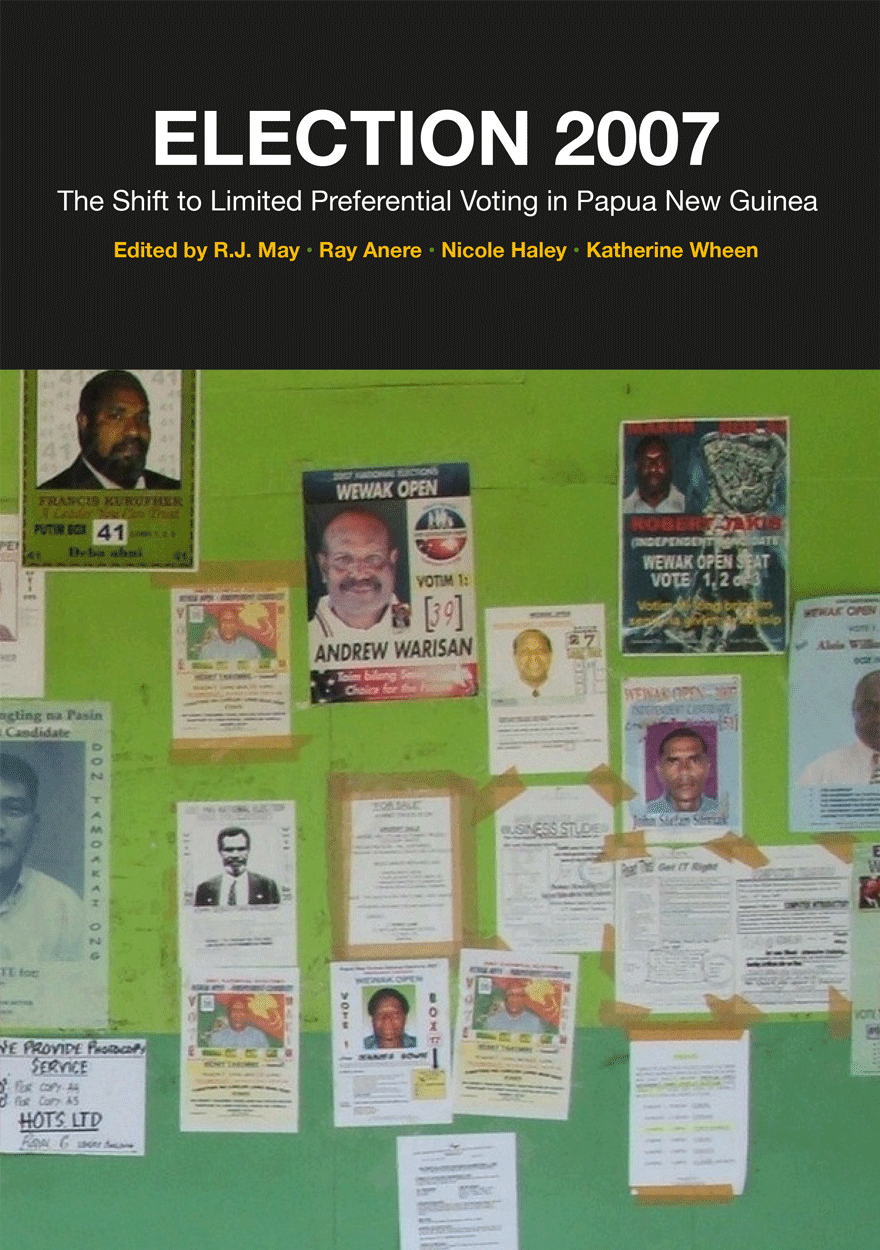
Election 2007 »
The Shift to Limited Preferential Voting in Papua New Guinea
Edited by: R.J. May, Ray Anere, Nicole Haley, Katherine Wheen
Publication date: September 2013
Papua New Guinea’s general election in 2007 attracted particular interest for several reasons. Not only did it follow what was widely acknowledged as the country’s worst election ever, in 2002 (in which elections in six of the country’s 109 electorates were declared to be ‘failed elections’), it was the first general election to be held under a new limited preferential voting system. It also followed the first full parliamentary term under the Organic Law on the Integrity of Political Parties and Candidates, which had been introduced in 2001 in an attempt to strengthen political parties and create a greater degree of stability in the national parliament, and was the first to embrace a ‘whole-of-government’ approach to electoral administration, through an Interdepartmental Electoral Committee. This volume provides an analysis of the 2007 election, drawing on the work of a domestic monitoring team organized through the National Research Institute, and several visiting scholars. It addresses key issues such as voter education, electoral administration, election security, the role of political parties, women as candidates and voters, the shift to limited preferential voting, and HIV transmission, and provides detailed accounts of the election in a number of open and provincial electorates. It is generally agreed that the election of 2007 was an improvement on that of 2002. But problems of electoral administration and voting behaviour remain. These are identified in this volume, and recommendations made for electoral reform.

craft + design enquiry: issue 5, 2013 »
A World In Making: Cities Craft Design
Edited by: Suzie Attiwill
Publication date: September 2013
craft + design enquiry is an open-access, peer-reviewed journal promoting and disseminating research excellence generated by and about the craft and design sector. craft + design enquiry investigates the contribution that contemporary craft and design makes to society, establishing a dialogue between craft and design practice and cultural, social and environmental concerns. It includes submissions from across the field of craft and design from artists and practitioners, curators, historians, art and cultural theorists, educationalists, museum professionals, philosophers, scientists and others with a stake in the future developments of craft and design.
Download for free
Not available for purchase

Putting Citizens First »
Engagement in Policy and Service Delivery for the 21st Century
Publication date: August 2013
This book explores the ways in which governments are putting citizens first in their policy-making endeavours. Making citizens the focus of policy interventions and involving them in the delivery and design is for many governments a normative ideal; it is a worthy objective and sounds easy to achieve. But the reality is that putting citizens at the centre of policy-making is hard and confronting. Are governments really serious in their ambitions to put citizens first? Are they prepared for the challenges and demands such an approach will demand? Are they prepared to commit the time and resources to ensure genuine engagement takes place and that citizens’ interests are considered foremost? And, more importantly, are governments prepared for the trade-offs, risks and loss of control such citizen-centric approaches will inevitably involve?
The book is divided into five parts:
setting the scene: The evolving landscape for citizen engagement
drivers for change: Innovations in citizen-centric governance
case studies in land management and Indigenous empowerment
case studies in fostering community engagement and connectedness
case studies engaging with information technology and new media.
While some chapters question how far governments can go in engaging with citizens, many point to successful examples of actual engagement that enhanced policy experiences and improved service delivery. The various authors make clear that citizen engagement is not restricted to the domain of service delivery, but if taken seriously affects the ways governments conduct their activities across all agencies. The implications are enormous, but the benefits to public policy may be enormous too.

Ted Freeman and the Battle for the Injured Brain »
A case history of professional prejudice
Authored by: Peter McCullagh
Publication date: August 2013
This book recounts some experiences of young Australians with catastrophic brain injuries, their families and the medical system which they encountered. Whilst most of the events described occurred two to three decades ago they raise questions relevant to contemporary medical practice.
The patients whose stories are told were deemed to be ‘unsuitable for rehabilitation’ and their early placement in nursing homes was recommended. In 2013, it is time to acknowledge that the adage of ‘one size fits all’ has no place in rehabilitation in response to severe brain injury. Domiciliary rehabilitation, when practicable, may be optimal with the alternative of slow stream rehabilitation designed to facilitate re-entry into the community.
Patients’ families were impelled to undertake heroic carers’ commitments as a reaction to nihilistic medical prognoses. It is time for the Australian health care system to acknowledge those commitments, and the budgetary burden which they lift from the system by providing family members with support to retrieve career opportunities, most notably in education and employment, which have been foregone in caring.
Medical attendants repeatedly issued negative prognoses which were often confounded by the patient’s long term progress. Hopefully, those undertaking the acute care of young people with severe brain injury will strive to acquire an open mind and recognise that a prognosis based on a snapshot observation of the patient, without any longer term contact provides a flawed basis for a prognosis. The story of these patients and of Dr Ted Freeman has wider implications.

China: A New Model for Growth and Development »
Edited by: Ross Garnaut, Cai Fang, Ligang Song
Publication date: July 2013
The Chinese economy is undergoing profound change in policy and structure. The change is necessary to increase the value of growth to the Chinese community, and to sustain growth into the future. The changes are so comprehensive and profound that they represent a new model of Chinese economic growth. This book describes the replacement of an old uninhibited investment expansion model of growth, by transition to modern economic growth and provides insights into recent changes and where they are likely to lead. These include requirements for building the new institutions including its public finances for future growth, adjustments in its savings, industry and agriculture, changes in its demographic structure, business environment, and pattern of rural-urban migration, prospects for ‘green growth’, its energy policy trilemma and the climate change mitigation strategy, and changes for China’s interaction with the international economy through its overseas investment and trade in high tech products. China’s adoption of a new model of economic growth is of immense importance to people in China and everywhere. This book is an early attempt to take a close look at many of the features of the new model.
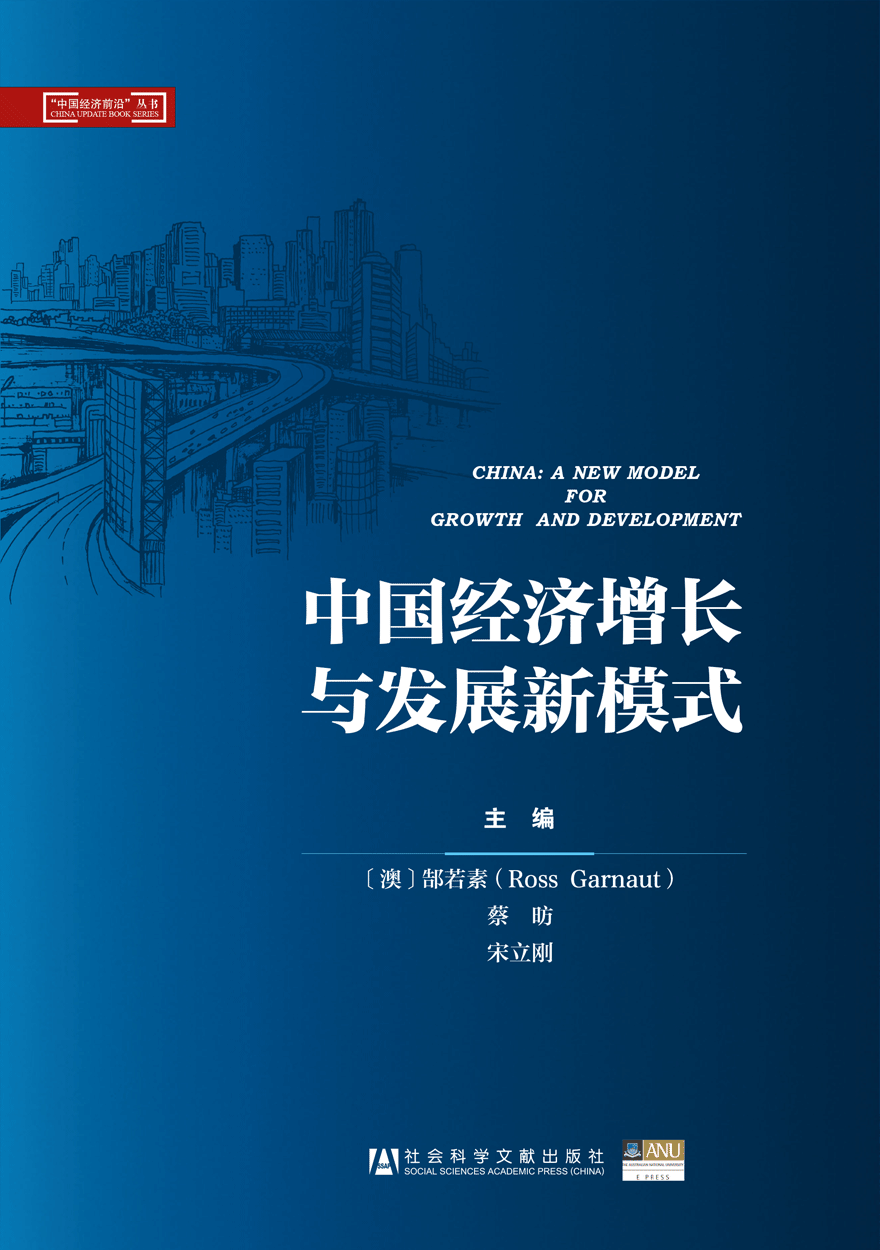
China: A New Model for Growth and Development (Chinese version) »
中国长期增长与发展的新战略: 责任与启示
Authored by: Ross Garnaut, 蔡 昉 宋立刚
Publication date: July 2013
中国经济正经历着政策和结构方面的深刻变革. 这种变革对于提高中国 社会的增长绩效、 保持未来中国经济的发展潜力都很有必要. 成功的经济发展改变了中国传统的增长模式, 也给经济发展带来了压力, 而这种压力正是变革的内驱力之一. 近年来, 劳动力短缺及真实工资迅速上涨给中国经济的传统模式带来了巨大挑战, 使得资源和收入分配、自然环境、经济增长率、储蓄率、 投资率与国际资本流动等都有所变化. 原有的增长模式在过去取得了巨大的成功, 也引发了上文所述的种种变化, 而国家政策层面上的改革亦会改善现状, 使中国的收人分配体系更加公平, 国内环境和国际环境更加有利于中国经济的发展.
Chinese version of this book is available from this Social Science and Academic Press.

Discretion and Public Benefit in a Regulatory Agency »
The Australian Authorisation Process
Authored by: Vijaya Nagarajan
Publication date: July 2013
This book explores the manner in which a variety of public benefits such as environmental protection and consumer safety have been accommodated through the authorisation process within competition law and policy in Australia. While the regulator’s use of its discretion can be explained as a triumph of practice over theory, this book explores the potential for competition principles to be imbued by the wider discourses of democratic participation and human rights. In doing so it makes a significant contribution to the Australian competition policy as well as reconceptualising the way in which discretion is used by regulators.
… a very important and creative contribution to the literatures on both business regulation in general and Australian competition and consumer protection law in particular. It pays special attention to an everyday regulatory function that is often ignored in scholarship. And it is very important in challenging—on both empirical and normative policy oriented grounds—a narrowly economic approach to competition law, and proposing an alternative understanding and practice for the public benefit test in ACCC authorisations.
— Professor Christine Parker
The data Vij Nagarajan has analysed is quite unique in its focus. It is a kind of data and analysis that has not been completed before in the international literature. It is well written, theoretically sophisticated and incisive in its policy analysis.
— John Braithwaite
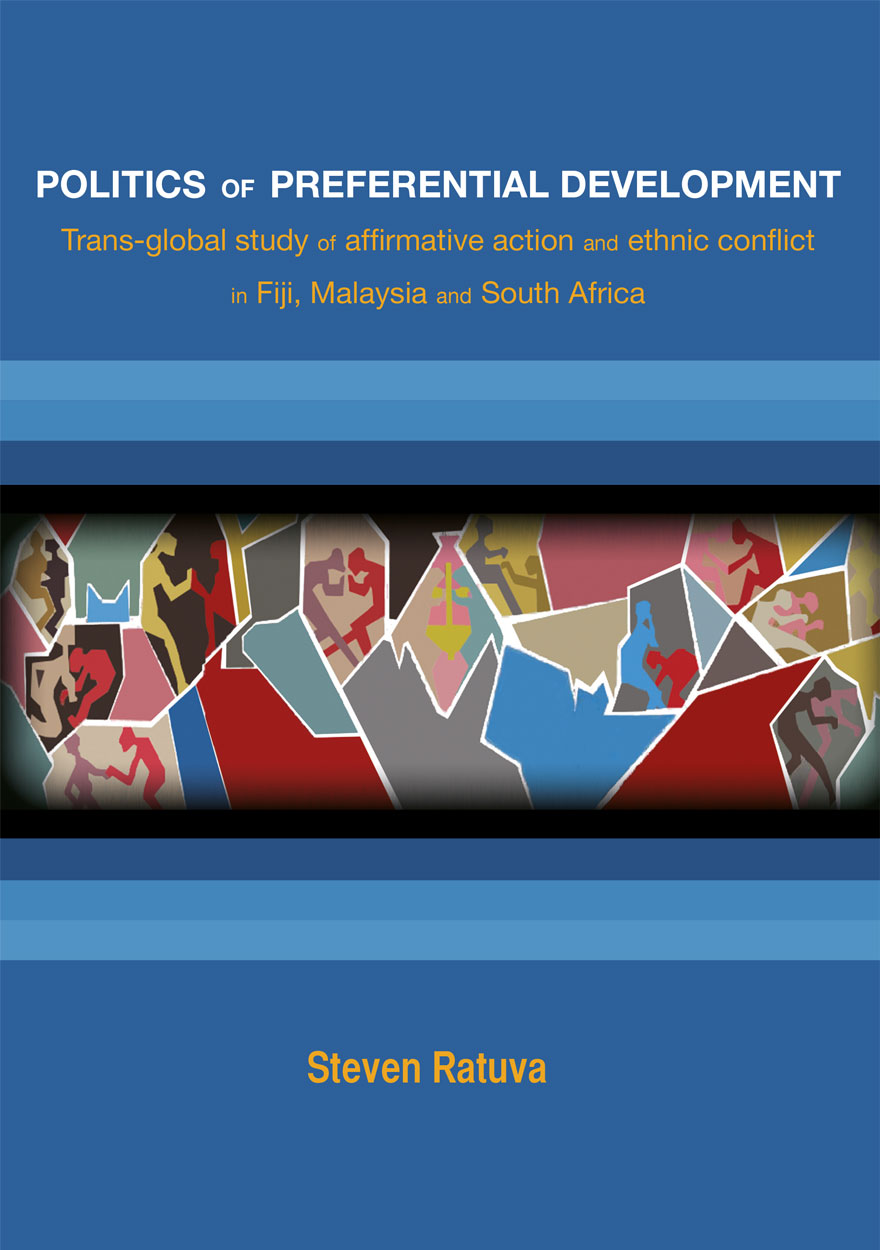
Politics of preferential development »
Trans-global study of affirmative action and ethnic conflict in Fiji, Malaysia and South Africa
Authored by: Steven Ratuva
Publication date: July 2013
The book is a critical examination of affirmative action, a form of preferential development often used to address the situation of disadvantaged groups. It uses a trans-global approach, as opposed to the comparative approach, to examine the relationship between affirmative action, ethnic conflict and the role of the state in Fiji, Malaysia and South Africa. While affirmative action has noble goals, there are often intervening political and ideological factors in the form of ethno-nationalism and elite interests, amongst others, which potentially undermine fair distribution of affirmative action resources. The book examines the affirmative action philosophies and programs of the three countries and raises pertinent questions about whether affirmative action has led to equality, social justice, harmony and political stability and explores future possibilities.
Steven Ratuva provides a brilliant critical study, not just of affirmative action policy and practice in three very different postcolonial contexts, but of the very complex matters of principle, justification and ideology that are involved more generally. It is an invaluable contribution to the literature on this important topic.
— Dr Stephanie Lawson, Professor of Politics and International Relations, Macquarie University.
Scholarly and provocative, Steven Ratuva’s Politics of Preferential Development is an original and insightful comparative contribution to the growing literature on affirmative action around the world.
— Dr Ralph Premdas, Professor of Public Policy, University of West Indies; Former Professor, University of California Berkeley and University of Toronto.
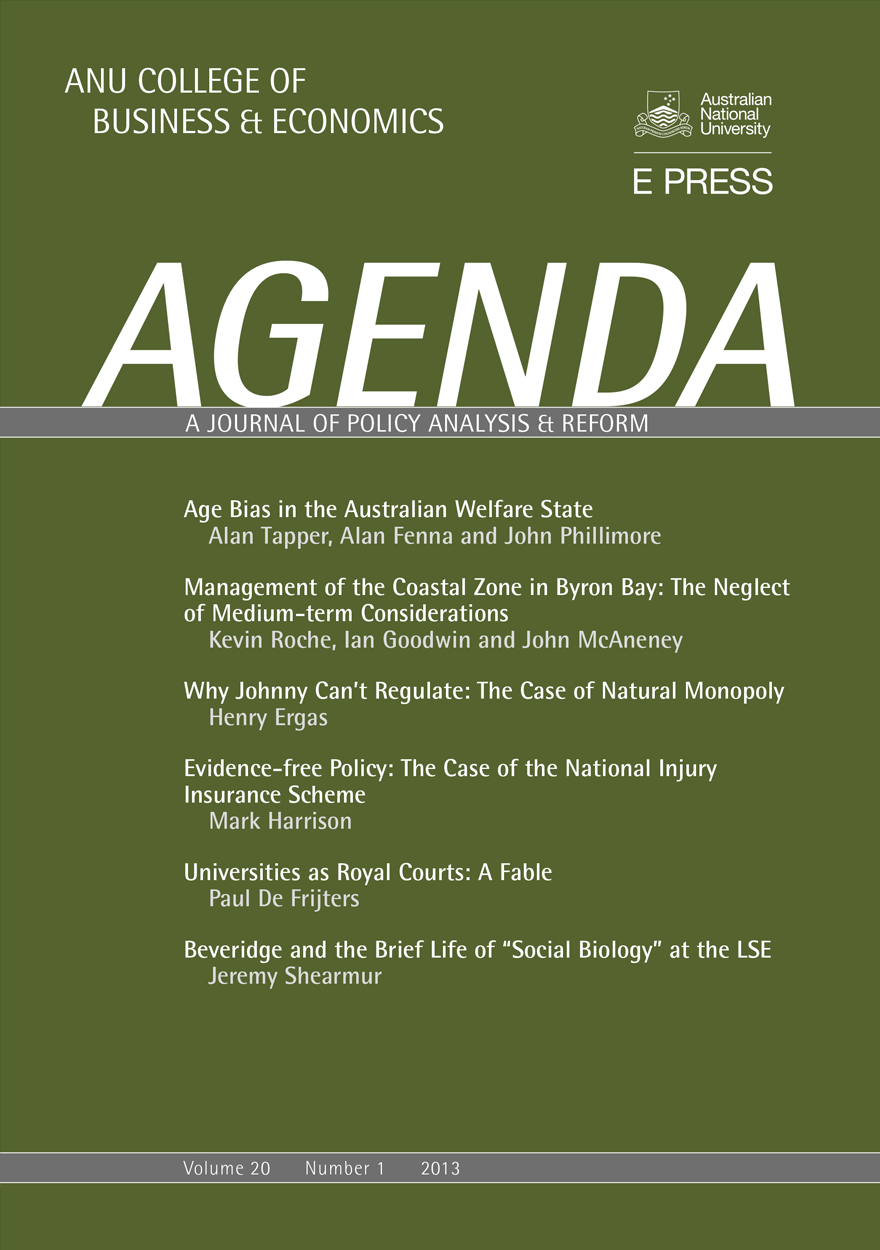
Agenda - A Journal of Policy Analysis and Reform: Volume 20, Number 1, 2013 »
Edited by: William Coleman
Publication date: July 2013
Agenda is a refereed, ECONLIT-indexed and RePEc-listed journal of the College of Business and Economics, The Australian National University. Launched in 1994, Agenda provides a forum for debate on public policy, mainly (but not exclusively) in Australia and New Zealand. It deals largely with economic issues but gives space to social and legal policy and also to the moral and philosophical foundations and implications of policy.
Subscribe to the Agenda Alerting service if you wish to be advised on forthcoming or new issues.
Download for free
Not available for purchase
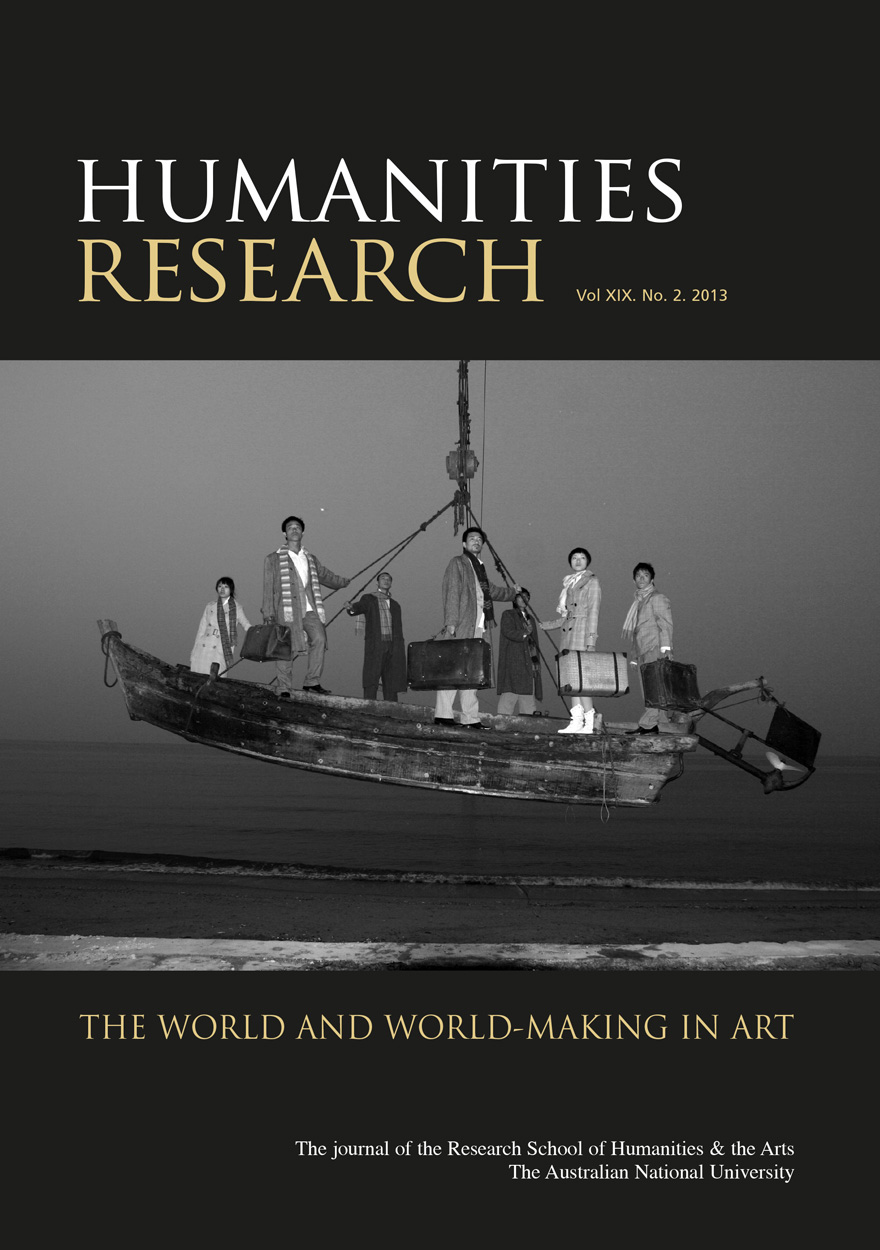
Humanities Research: Volume XIX No. 2. 2013 »
The World and World-Making in Art
Edited by: Michelle Antoinette, Zara Stanhope, Caroline Turner
Publication date: July 2013
Humanities Research is an internationally peer-reviewed journal published by the Research School of Humanities at The Australian National University. The Research School of Humanities came into existence in January 2007 and consists of the Humanities Research Centre, Centre for Cross-Cultural Research, National Europe Centre and Australian National Dictionary Centre. Launched in 1997, issues are thematic with guest editors and address important and timely topics across all branches of the humanities.
Download for free
Not available for purchase

Macassan History and Heritage »
Journeys, Encounters and Influences
Edited by: Marshall Clark, Sally K. May
Publication date: June 2013
This book presents inter-disciplinary perspectives on the maritime journeys of the Macassan trepangers who sailed in fleets of wooden sailing vessels known as praus from the port city of Makassar in southern Sulawesi to the northern Australian coastline. These voyages date back to at least the 1700s and there is new evidence to suggest that the Macassan praus were visiting northern Australia even earlier. This book examines the Macassan journeys to and from Australia, their encounters with Indigenous communities in the north, as well as the ongoing social and cultural impact of these connections, both in Indonesia and Australia.

East Asia Forum Quarterly: Volume 5, Number 2, 2013 »
Publication date: June 2013
East Asia Forum Quarterly grew out of East Asia Forum (EAF) online, which has developed a reputation for providing a platform for the best in Asian analysis, research and policy comment on the Asia Pacific region in world affairs. EAFQ aims to provide a further window onto research in the leading research institutes in Asia and to provide expert comment on current developments within the region. The East Asia Forum Quarterly, like East Asia Forum online, is an initiative of the East Asia Forum (EAF) and its host organisation, the East Asian Bureau of Economic Research (EABER) in the Crawford School of Economics and Government in the College of Asia & the Pacific at The Australian National University.
Download for free
Not available for purchase

Asia-Pacific Security »
Policy Challenges
Edited by: David W. Lovell
Publication date: May 2013
Since September 11, 2001, our newspapers have been filled with the ‘war on terror’; our governments have mobilised their resources for ‘homeland security’; and people everywhere are braced for more terrorist attacks.
Yet while the new threat is genuine, we must not lose sight of the continuing security concerns in the Asia-Pacific. Tensions persist on the Korean peninsula, in the Taiwan Straits and the South China Sea, and in Kashmir. The region is well supplied with weapons of mass destruction and may face an arms race, and there are a range of pressing human security issues. Likewise, the strategic realities of the region remain linked with US power, and with the emergence of China as a key regional player.
The book examines the developing strategic relationships in the region, and clarifies the dilemmas for Australian policy-makers as they try to balance genuine engagement with the region against a long-standing and valued alliance with the United States.
Emerging from discussions between the Shanghai Institute for International Studies and the University of New South Wales at ADFA, Asia-Pacific Security has a particular relevance for foreign-policy professionals and scholars of the region.
Printed copies of this book may be ordered from ISEAS publishing.

France in the South Pacific »
Power and Politics
Authored by: Denise Fisher
Publication date: May 2013
France is a Pacific power, with three territories, a military presence, and extensive investments. Once seen by many as a colonial interloper in the South Pacific, by the early 2000s, after it ended nuclear testing in French Polynesia and negotiated transitional Accords responding to independence demands in New Caledonia, France seems to have become generally accepted as a regional partner, even if its efforts concentrate on its own territories rather than the independent island states.
But France’s future in the region has yet to be secured. By 2014 it is to have handed over a set of agreed autonomies to the New Caledonian government, before an independence referendum process begins. Past experience suggests that a final resolution of the status of New Caledonia will be divisive and could lead once again to violent confrontations. In French Polynesia, calls continue for independence and for treatment under UN decolonisation procedures, which France opposes. Other island leaders are watching, so far putting faith in the Noumea Accord, but wary of the final stages. The issues and possible solutions are more complex than the French Pacific island population of 515,000 would suggest.
Combining historical background with political and economic analysis, this comprehensive study offers vital insight into the intricate history – and problematic future – of several of Australia’s key neighbours in the Pacific and to the priorities and options of the European country that still rules them. It is aimed at policy-makers, scholars, journalists, businesspeople, and others who want to familiarise themselves with the issues as France’s role in the region is redefined in the years to come.



